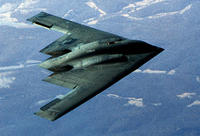-
U.S. persuades Israel Iran nuclear threat is at least a year away
American officials say the Obama administration, citing evidence of continued troubles inside Iran’s nuclear program, has persuaded Israel that it would take roughly a year — and perhaps longer — for Iran to complete what one senior official called a “dash” for a nuclear weapon; “We think that they have roughly a year dash time,” one of Obama’s top adviser on nuclear issues says; “A year is a very long period of time”
-
-
Iran gearing up for a post-attack retaliatory campaign in Western Hemisphere
In February 2007, Iran Air launched flight 744 — a bimonthly flight that originates in Tehran and flies directly to Caracas with periodic stops in Beirut and Damascus; passengers cannot book a seat on the flight because it has never been opened to the public; U.S. intelligence services have been worried for a while now that the flight is used for two purposes: first, for smuggling nuclear weapons-related materials into Iran, and, second — in cooperation with Venezuela — for setting up a network of Iranian operatives to retaliate against U.S. targets and Jewish communities in the Western Hemisphere in the event of a U.S. or Israeli attack on Iran’s nuclear weapons facilities
-
-
House Cybersecurity Caucus launches new Web site
Billions of dollars are spent on cybersecurity; the House cybersecurity caucus has launched a new Web site, and observers say it could provide a valuable public service if it helps aggregate disparate activities and acts as a Federal cybersecurity information hub
-
-
Case against teachers using Web cams to monitor students' bedrooms, laptops dropped
Federal investigations into whether a Pennsylvania school district used school-issue laptops to take pictures of students — and of what they were doing in their bed rooms and online — did not yield enough evidence to file charges; Lower Merion School District monitored more than 40 students who were issued laptop computers; the monitoring generated 30,881 Webcam photographs of students, and 27,761 screenshots of Web sites they visited
-
-
Bolton: Israel should attack Iran's reactor by this week's end

Since 1960, Israel relied on covert — and, at times, less covert — campaign to prevent Egypt, Iraq, and Syria from acquiring nuclear weapons; in the cases if Iraq (1981) and Syria (2007), Israel destroyed these countries’ nuclear reactors before they became critical; the reason: destroying nuclear reactors before they become critical eliminates the risk of radioactive radiation from the destroyed reactor spreading over large areas, as was the case with the Chernobyl reactor following the 1986 accident; Russian state firm Rosatom announced last week that it would be starting loading nuclear fuel into the Bushehr facility on 21 August, and that the plant would become operation on that day; will Israel launch a strike against the plant before that date?
-
-
Arizona waits for court decision before changing immigration law
In response to the 28 July decision by U.S. District Judge Susan Bolton to block the more important provisions of the controversial Arizona immigration law, Governor Jan Brewer suggested that Arizona may “tweak” the law in order to address Bolton’s objections; Arizona legislatures say there is no point in rewriting the law while the state is appealing the judge’s decision; in any event, since Bolton blocked the provisions on grounds that they are preempted by federal authority over immigration matters, then the preemption issue will have to be settled by the courts before the legislature revisits the law
-
-
Resurgence of violence in Ireland leads to questions about MI5 intelligence gathering
The Police Federation of Northern Ireland has attributed 49 bomb incidents and 32 shooting incidents to dissident republicans since the beginning of the year; so far this year, on both sides of the border, there have been 155 arrests and 46 charges related to militant republican activities compared with 108 arrests and 17 charges in the whole of 2009; law enforcement authorities in Northern Ireland complain about an alleged lack of information from MI5 about increasingly active republican groups
-
-
Deep judicial disagreements over increased police use of GPS surveillance
The U.S. Court of Appeals for the District of Columbia on 6 August overturned a drug-trafficking conviction because the police, without a warrant, placed a GPS tracking device on the suspect’s car; the decision contradicted decisions in three similar GPS-related cases by appellate panels in Chicago, St. Louis, and San Francisco; there are fierce judicial disagreements on the issue: Judge Douglas Ginsburg, who oppose GPS surveillance without a warrant, writes that “Prolonged surveillance reveals types of information not revealed by short-term surveillance, such as what a person does repeatedly, what he does not do, and what he does ensemble;” Judge Richard Posner, who says warrants are not necessary for GPS surveillance, says that the Fourth Amendment “cannot sensibly be read to mean that police shall be no more efficient in the 21st century than they were in the 18th”; Chief Judge Alex Kozinski characterized the GPS tracking as “creepy and un-American” and contended its capabilities handed “the government the power to track the movements of every one of us, every day of our lives”
-
-
Maple syrup producer ends factory floor tours
For almost a century Maple Grove Farms of St. Johnsbury, Vermont, has produced maple syrup and maple candies; for much of that time, tourists have been able to watch the production process from the factory floor — but not anymore: fears about terrorists, disguised as visitors, contaminating some of the more than twelve million pounds of maple products processed every year lead company to end tours
-
-
Growing privacy concerns over Google's Street View
Worries about the privacy invasion by Google’s Street View project have led several countries to scrutinize the ambitious mapping project; Goolge offers concerned home owners the opportunity to submit a request to have their houses taken off the service, but a Google spokeswoman admits that “Processing these requests and applying blurring is a complex task which takes time”; concerns about privacy infringement were only heightened when it was learned that Google, inadvertently perhaps, also picks up private WiFi communication in the process of updating its maps — and that a Google U.K. executive has purchased a surveillance UAV (he said it was for personal use)
-
-
FBI grants more top secret clearances for terrorism cases
Security clearances granted to members of the FBI’s network of regional terrorism task forces jumped to 878 in 2009, up from 125 in 2007, signaling intensified attention to domestic terror threats; part of the increase is because of the rapid expansion of the terrorism task forces created after the 2001 assaults to disrupt future terror plots; since 2001 the number of terror units, which draw on federal, state, and local investigators, have grown from 35 to 104 nationwide
-
-
U Rochester lands $15 million to study medical response to nuclear terrorism
Research has revealed that it is not just the immediate effect of radiation that makes adults and children sick; rather, the radiation damage can remain relatively undetected in key tissues and organs, but will trigger life-threatening illnesses after an injury that occurs later; new project places the University of Rochester Medical Center firmly in a leadership position in the counterterrorism effort
-
-
The promise, and risks, of battlefield biometrics
Using biometric devices in Afghanistan offers many benefits to coalition forces and to the Afghani themselves in making it easier to separate the good guys from the bad; some worry, however, that this can backfire — as was the case in Rwanda in 1994: identification cards which included photos and tribal affiliations of either Tutsis and Hutus made it easier for Hutu militias to identify the Tutsi and murder them
-
-
Surge in counterfeit items in Pentagon's supplies
The U.S. Defense Department’s supply chain is vulnerable to the infiltration of counterfeit parts, potentially jeopardizing the lives of American soldiers; government investigators examined 387 companies and organizations which supply the U.S. Department of Defense, and found 39 percent of these companies and organizations encountered counterfeit electronics during the four-year period 2005-8; the number of counterfeit incidents grew from 3,868 in 2005 to 9,356 in 2008
-
-
B-2 Stealth bomber engineer convicted of selling stealth technology to China

A federal jury convicted a former B-2 stealth bomber engineer of helping China design a stealth cruise missile; the case is one of a series of major prosecutions targeting Chinese spying on the United States; in March, Chinese-born engineer Dongfan “Greg” Chung was sentenced to more than fifteen years in prison after he was convicted of six counts of economic espionage; investigators learned about Chung while probing Chi Mak, a defense contractor engineer convicted in 2007 of conspiracy to export U.S. defense technology to China; Mak was sentenced to twenty-four years in prison in 2008
-
More headlines
The long view
Factories First: Winning the Drone War Before It Starts
Wars are won by factories before they are won on the battlefield,Martin C. Feldmann writes, noting that the United States lacks the manufacturing depth for the coming drone age. Rectifying this situation “will take far more than procurement tweaks,” Feldmann writes. “It demands a national-level, wartime-scale industrial mobilization.”
No Nation Is an Island: The Dangers of Modern U.S. Isolationism
The resurgence of isolationist sentiment in American politics is understandable but misguided. While the desire to refocus on domestic renewal is justified, retreating from the world will not bring the security, prosperity, or sovereignty that its proponents promise. On the contrary, it invites instability, diminishes U.S. influence, and erodes the democratic order the U.S. helped forge.
Fragmented by Design: USAID’s Dismantling and the Future of American Foreign Aid
The Trump administration launched an aggressive restructuring of U.S. foreign aid, effectively dismantling the United States Agency for International Development (USAID). The humanitarian and geopolitical fallout of the demise of USAID includes shuttered clinics, destroyed food aid, and China’s growing influence in the global south. This new era of American soft power will determine how, and whether, the U.S. continues to lead in global development.
Water Wars: A Historic Agreement Between Mexico and US Is Ramping Up Border Tension
As climate change drives rising temperatures and changes in rainfall, Mexico and the US are in the middle of a conflict over water, putting an additional strain on their relationship. Partly due to constant droughts, Mexico has struggled to maintain its water deliveries for much of the last 25 years, deliveries to which it is obligated by a 1944 water-sharing agreement between the two countries.
How Disastrous Was the Trump-Putin Meeting?
In Alaska, Trump got played by Putin. Therefore, Steven Pifer writes, the European leaders and Zelensky have to “diplomatically offer suggestions to walk Trump back from a position that he does not appear to understand would be bad for Ukraine, bad for Europe, and bad for American interests. And they have to do so without setting off an explosion that could disrupt U.S.-Ukrainian and U.S.-European relations—all to the delight of Putin and the Kremlin.”
How Male Grievance Fuels Radicalization and Extremist Violence
Social extremism is evolving in reach and form. While traditional racial supremacy ideologies remain, contemporary movements are now often fueled by something more personal and emotionally resonant: male grievance.
